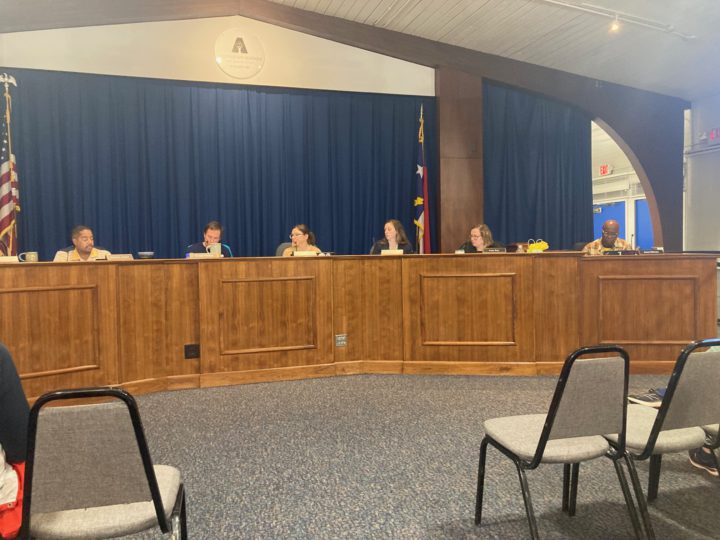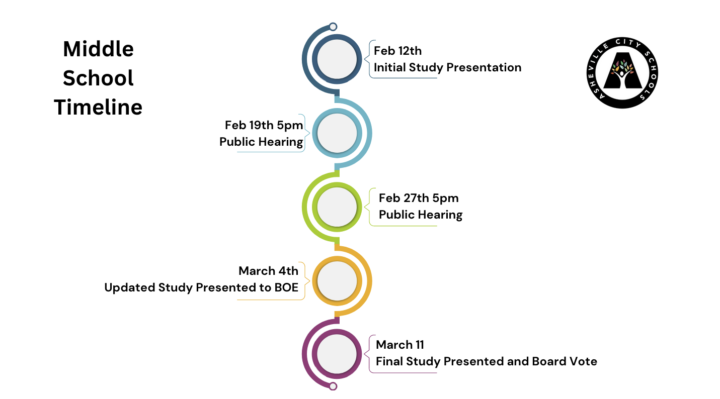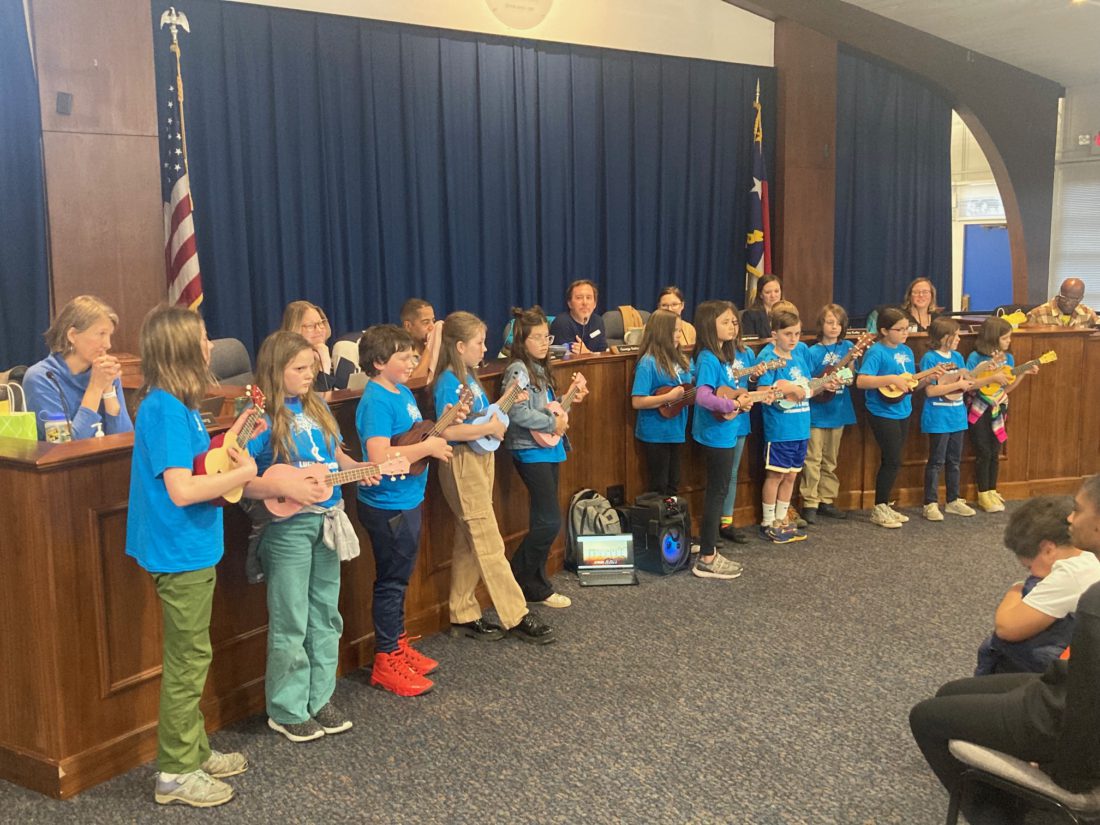Eight months after the Buncombe County Board of Commissioners agreed to raise taxes in order to provide a 2% supplement increase for school staff, employees in the Asheville City Schools district will see the effects of that raise.
The Asheville City Board of Education voted unanimously Feb. 12 to make those raises permanent, despite a projected $4.5 million budget shortfall in 2024-25. ACS Chief Financial Officer Heidi Kerns says staff will receive the raises retroactive to the beginning of the 2023-24 school year. The board vote on raises was delayed because the state’s budget, which funds education, didn’t pass until late September. Kerns, who was hired in October, needed time to review the district’s finances before presenting them to the board, she said.
The board heard pleas from a number of staff members in front of an overflowing boardroom ahead of the vote on whether to make the raises a one-time bonus or a permanent increase.
“The dedicated staff of Asheville City Schools who were struggling financially in February 2023 are still struggling. It’s frustrating because I don’t believe that I need to convince the board that our staff deserves a living wage. I don’t believe that I need to convince you that you should be able to live in the community where you work. I think you agree on this. So I’m just here today to say that this is the moment when I hope that you will agree with some of the agreements that we worked on last year that you pledged to use the money from the commissioners for our local supplements,” said Baily Griffith, a media coordinator at Claxton Elementary.
Pricilla Greene, a second grade teacher who was honored at the start of the meeting for achievements at Lucy Herring Elementary, noted that the board’s applause was not enough to put food on the table.
“Later tonight, you possibly plan to take my money away as if to say, ‘Good job. Go home, pay your rent with applause.’ Or, ‘Thanks for making us look good. Keep doing that while you starve.’ … When the oil company brings the oil to keep me warm for the remainder of the winter, I’ll be sure to pay them with my compliments,” she added.
The permanence of staff raises was at the center of the board’s debate. During a work session Feb. 5, Kerns informed the board that it could spend up to $2.1 million this year on teacher supplements without affecting the district’s reserve fund balance.

Next year, however, is a different story. Before the supplement raise was considered, Kerns estimated that the district faces a $3.5 million shortfall in part due to expiring COVID money and shrinking enrollment. Each percentage point raise in the supplement costs ACS about $500,000, according to district calculations.
“I think we are here for one reason. Can we pay 2% to our teachers?” asked board member Jesse Warren.
That answer, for now, is yes, although it may force the district to dip into the reserves next year, Kerns warned. The district has $15.2 million in reserve.
Vice Chair Amy Ray said that was concerning, considering “scary” funding shortfalls happening in districts around the state.
Durham Public Schools’ superintendent and finance director both resigned last week after accounting errors led to the district overpaying staff for months, leading to the school board using half of its reserves to pay staff in the short term, according to the Durham Herald Sun. Also last week, Alamance County officials bailed out a nearly bankrupt Alamance-Burlington School System with $250,000 to prevent dozens of layoffs, as reported in WGHP in Greensboro.
“It drives me crazy what our General Assembly in Raleigh is doing to public education. It drives me bonkers. Especially someone sitting here as a board member, looking at a sea of educators. … It drives me crazy,” said board Chair George Sieburg. “I understand that that cliff coming up, that shortfall, and yet I don’t from my heart, I don’t know if just a one-time bonus is enough to say to the folks in this room and those who aren’t in this room, ‘We want to do what’s right for you,’” he said.
After the raises, a first-year teacher will get an 11% local supplement, a $780 raise over the previous pay rate. That comes to $43,290 paid over 10 months, according to district documents. The supplement percentage increases based on years of experience, with teachers with more than 15 years of experience getting an 18.5% local supplement annually. Those numbers closely reflect supplements provided in the neighboring Buncombe County Schools district.
Timothy Lloyd, Asheville City Association of Educators president, told Xpress after the meeting that members of the self-described union will keep fighting for higher pay.
“The members of ACAE are happy but not entirely satisfied. Given the public comment shared by our members, we know that 2% is a first step. Everything starts with a first step, and this first step is promising,” he said after the meeting.
ACAE, and eventually the school board, initially asked county commissioners for enough to give teachers a 7% raise, according to Xpress reporting last spring.
School consolidation
To help make up some of the district’s upcoming budget shortfall, the board confronted the possible consolidation of two or more of its schools.
Superintendent Maggie Fehrman presented preliminary results of a districtwide enrollment study from Cooperative Strategies, commissioned in November for $28,500 to assess the feasibility of school consolidation. She also is searching for a more permanent home in an ACS-owned facility for the Education and Career Academy, currently housed at the Housing Authority of the City of Asheville’s Arthur R. Edington Education and Career Center.
The initial analysis showed that all ACS facilities are under capacity to varying degrees and enrollment has declined by about 600 students since 2014-15 while staffing levels have stayed the same. Fehrman said she has considered several consolidation and reconfiguration options, including eliminating one elementary, middle or high school, or creating a combo K-8, 6-12 or K-12 school.
She outlined the specific advantages and hardships of either moving the district’s smaller middle school, Montford North Star Academy, to Asheville Middle School; relocating it to an elementary school to create a K-8 school; or combining the two middle schools into one larger middle school. Making no change is “not financially sustainable” for the district, she said.
“My goal is to help identify a good plan that meets the needs of our students but also understanding that we’re going to have to make some changes. There’s just no question about it,” Fehrman said.
The greatest savings — estimated at $1.8 million to $2.3 million — would come from merging the two middle schools, which would eliminate 18 positions through attrition, according to Fehrman’s analysis. The district would only save about $311,000 by moving MNSA to an existing school’s campus without a full merger, she said.
All four of Cooperative Strategies’ projections showed declines in ACS enrollment over the next 10 years of 300 to 1,100 students. It recommended the plan that assumes losing about 800 students by 2034, which represents 20% of its current student body.
Fehrman plans to continue reorganizing central office staff to maximize efficiency and launch a marketing campaign to increase enrollment at ACS, according to the presentation.
Board member Liza Kelly asked why the district is turning away out-of-district students when all the schools are underenrolled. Out of 212 out-of-district applications in the 2023-24 school year, 28 were denied, according to the presentation.
Fehrman said the district follows board policy for all application denials, some of which include students with special needs that the district can’t meet.
“Our goal is to bring in as many students as we can … because I know the programming that we offer in our schools is phenomenal,” Fehrman said.
On the question of middle school consolidation, board member Rebecca Strimer asked if the two middle school principals were involved in how the district could move forward, including implementing successful programs from each school.

Fehrman said she has started that discussion and planned to involve other staff members and students at the schools who could help integrate programming if the board decided to move in that direction.
Later in the meeting, Fehrman announced that MNSA Principal Shannon Baggett is being promoted to assistant superintendent of curriculum and instruction. Assistant Principal Miranda Wheeler will serve as the acting principal of the school as it undergoes consolidation consideration.
ACS plans to hold public hearings on middle school consolidation Feb. 19 and 27 at the central office. Fehrman will present an updated enrollment and capacity study to the board March 4, and a vote on the matter is scheduled for the March 11 board meeting, Fehrman said.
Board passes policies related to new state law
After months of discussion, the board unanimously passed policies to comply with the state law that proponents refer to as the “Parents’ Bill of Rights” and critics call the “Don’t Say Gay” law.
Multiple public comment sessions were held over the last month on the topic, and after multiple revisions, the board opted to comply with the law.
“At its core, we know that the so-called Parents’ Bill of Rights seeks to harm our queer youth and families. As misguided and obtuse as this legislation is, it is written in such a crafty way that as a school board, our hands have been tied,” said Sieburg after the policies passed. “Whatever policies and practices we as a board and we as a district choose to enact they do nothing to change the harmful effects of this law. Therefore, refusing to pass the policies as a matter of principle would neither negate the law or protect our kids, in our view.”
Craig White, the supportive schools director for the Campaign for Southern Equality, who has spoken out against the law and corresponding policies at both local school board meetings, said while he wished the board had openly refused to comply with the discriminatory aspects of the law, he understood its position.
“I think the ACS board did everything that they could do to reduce the harm in the law without openly defying it,” he said.
White said the board “stripped the most discriminatory language and phrases targeting transgender students out of their policy,” made it clear that treating LGBTQ+ stakeholders differently constitutes discrimination and made it clear that teachers who support LGBTQ+ students have protections in district policy and federal law for doing so.
The board also moved much of the law’s elements to district procedures, rather than policies, allowing for more flexibility for staff to work with students and families on a case-by-case basis, White added.
CSE has launched a federal Title IX complaint against the N.C. State Board of Education and the Buncombe County Board of Education over the law.
“Personally, I hope that complaint gets its fair day in court. In the meantime, we remain focused on what we as a board can do to support our youth now in the face of the law. And for this board, that means combing through and revising policy language to make sure that our staff and students know their well-being is foremost,” Sieburg said.
The board will discuss reform policy focusing on more protections for students impacted by the state law at its March work sessions, Sieburg added.




Burn thoise reserves. Hope the feds funnel some more money they don’t actually have down to the local level via the states.
$34 trillion and counting. Interest now has passed defense at over 10% of the federal budget.